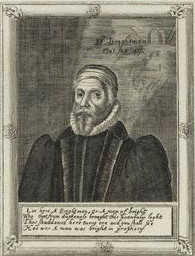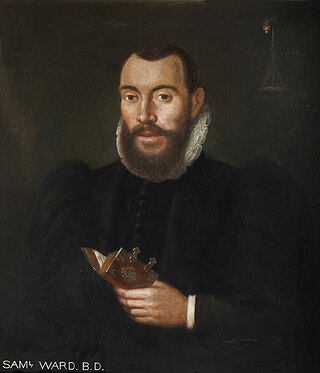
Joseph Hall was an English bishop, satirist and moralist. His contemporaries knew him as a devotional writer, and a high-profile controversialist of the early 1640s. In church politics, he tended in fact to a middle way.

Richard Neile was an English churchman, bishop successively of six English dioceses, more than any other man, including the Archdiocese of York from 1631 until his death.
George Davys (1780–1864) was an English cleric, tutor to Queen Victoria, and later Bishop of Peterborough. He was previously Dean of Chester. He himself was educated at Loughborough Grammar School, where a house is named after him.

George Montaigne was an English bishop.

John Overall (1559–1619) was the 38th bishop of the see of Norwich from 1618 until his death one year later. He had previously served as Bishop of Coventry and Lichfield, as Dean of St Paul's Cathedral from 1601, as Master of Catharine Hall from 1598, and as Regius Professor of Divinity at Cambridge University from 1596. He also served on the Court of High Commission and as a Translator of the King James Version of the Bible.
Robert Tounson — also seen as “Townson” and “Toulson” — was Dean of Westminster from 1617 to 1620, and later Bishop of Salisbury from 1620 to 1621. He attended Sir Walter Raleigh at his execution, and wrote afterwards of how Raleigh had behaved on that occasion.

John Boys (1571–1625) was Dean of Canterbury from 1619 to 1625.
Edward Martin, D.D. was an English clergyman, ejected President of Queens' College, Cambridge, and at the end of his life Dean of Ely.

Thomas Brightman (1562–1607) was an English clergyman and biblical commentator. His exegesis of the Book of Revelation, published posthumously, proved influential. According to William M. Lamont, Brightman and Joseph Mede were the two most important revisionists of the interpretation and eschatology set down by John Foxe; among Brightman's contributions was to weaken the imperial associations tied to the Emperor Constantine I. The detailed reading, in favour of the Genevan and Scottish churches, and condemning the 'Laodicean' (lukewarm) Church of England, helped to move on the Puritan conceptions of church reform and its urgency.
Anthony Wotton was an English clergyman and controversialist, of Puritan views. He was the first Gresham Professor of Divinity. Christopher Hill describes him as a Modernist and Ramist.

Peter Smart (1569–1652?) was an Anglican Puritan clergyman, kept imprisoned for 12 years after he preached against innovations in the ceremonies at Durham Cathedral.
Samuel Collins (1576–1651) was an English clergyman and academic, Regius Professor of Divinity at Cambridge and Provost of King's College, Cambridge.

John May (Meye) was an English academic and churchman, who became Bishop of Carlisle. He also served the House of De Vere as cleric in Buckinghamshire.

Samuel Ward (1577–1640) was an English Puritan minister of Ipswich.
Thomas Goad (1576–1638) was an English clergyman, controversial writer, and rector of Hadleigh, Suffolk. A participant at the Synod of Dort, he changed his views there from Calvinist to Arminian, against the sense of the meeting.
Francis Dee was an English churchman and Bishop of Peterborough from 1634.
John Towers was an English churchman, Bishop of Peterborough from 1639, a royalist and a supporter of the ecclesiastical policies of William Laud.
Nicholas Robinson was a Welsh Bishop of Bangor and correspondent of Lord William Cecil, Sir Francis Walsingham, and Robert Dudley, 1st Earl of Leicester. He was also a dean and vice-president of a college at Queens' College, Cambridge.

William Cooke (1711–1797) was an English cleric and academic, Provost of King's College, Cambridge from 1772 and Dean of Ely from 1780.
Humphrey Tyndall was an English churchman who became the President of Queens' College, Cambridge, Archdeacon of Stafford, Chancellor of Lichfield Cathedral and Dean of Ely.










